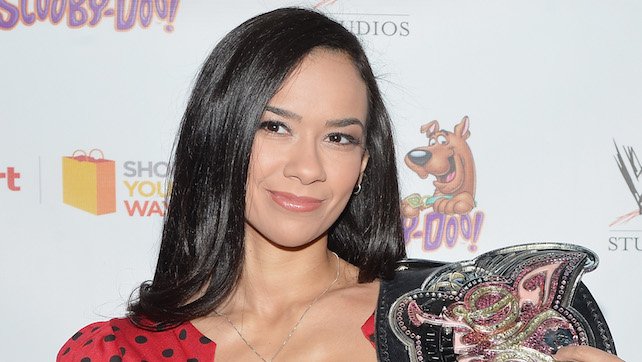AJ Lee was a special guest on Neil DeGrasse Tyson’s StarTalk Radio this week to talk about her life in professional wrestling as well as her journey with bipolar disorder. In this interview, Lee touches upon the disorder and how the process of diagnosis and medication can be an intimidating and different experience for the individual. Also throughout the interview are clips in between of DeGrasse himself talking about the physics of wrestling and mental health intricacies with neuroscientist Dr. Heather Berlin. Quotes from Lee are below:
On this episode of StarTalk Radio, Neil deGrasse Tyson enters the ring with former WWE star AJ Mendez (aka AJ Lee) to explore her latest book, Crazy Is My Superpower: How I Triumphed by Breaking Bones, Breaking Hearts, and Breaking the Rules, and how she turned her mental illness into a superpower. Joining Neil in-studio is comic co-host Chuck Nice and neuroscientist and StarTalk All-Stars host Dr. Heather Berlin, PhD.
AJ Lee talks about discovering her fandom in comic books, fantasy and professional wrestling:
I tried to find solace and escape in the world of fantasy and fiction, and so that was comic books, that was anime, that was video games, but I found such an escape in the world of fantasy where there were superheroes that were strong and fighting crime and the good guy would win at the end of the day. Then I found professional wrestling and these people were flesh and blood superheroes in spandex and so from a young age I saw that that it just spoke to me and I saw a place for me that wasn’t represented.
On how dealing with injuries in wrestling differed for her:
I think what made it more difficult for me is being bipolar and being on certain medications. When you get injuries some people are like “Okay, I’ll take a painkiller.” I couldn’t do that. I didn’t trust myself doing that. I didn’t think that was safe so I had to power through all that stuff.
On how diagnosis, treatment and medication can be a process and different for every person:
A lot of people get intimidated about the long road to recovery and sometimes people get misdiagnosed as just being depressed and anti-depressants are really dangerous if you’re bipolar, but when you find the right diagnosis, it is a bit of a struggle to get your perfect formula for treatment.
Two people are not going to have the same treatment. They’re not going to have the same medication, or just how they treat themselves in life, whether it’s meditation or exercise or therapy. You have to find the right cocktail for you and I found that luckily early enough to gain complete control over my life.
I think not only is there a science behind it of the serotonin and the endorphins that it’s it releasing when you get that high, but there’s something about feeling capable and feeling strong and, “okay, I can lift this weight,” or “I did a four mile run” and just feeling capable is something that will bring you out of any funk that you’re in.
Any part of her personality that she credits or blames on her bipolar disorder:
The source of my powers, if you will, I find that I believe in myself possibly a little too much sometimes. You know, I don’t a lot of people thought you could go from homeless to being a champion on television, or they could go from being underweight and sickly to being in wrestling into an athletic career. There’s a lot of people that didn’t think a pro wrestler was smart enough to write a book by herself.
It made me braver, it made me tougher, it made me a little brazen that maybe rubbed people the wrong way, but at least I was always honest. I’m the kind of person that can’t really keep my mouth shut. If I see that there is some sort of injustice the world, even if I have to stand up alone, I’m gonna stand up.
And being like extra empathetic because you have this large range of emotions. I can feel other people’s pain, maybe a little too deeply, but at least I understand them. I think my best qualities have come from being bipolar, and I’m afraid to think of who I’d be without it.
On what she had to do in her life to deal with bipolar disorder:
There’s this feeling of machismo and this tough as nails sort of mandate amongst our [Hispanic] families and so that was one thing that was against me. Being a tiny woman was another thing against me. I think there’s something about being young and naive and kind of just hopeful that you can really do anything in the world and not knowing the realities of the world that somehow didn’t stop me. It just made me want to kind of fight for it harder.
(Transcription credit should go to Dominic DeAngelo of WrestleZone)
You can listen to the full audio interview with AJ Lee below:
RELATED: AJ Lee Promotes Mental Health Month, Mickie James Set For Musical Performance





